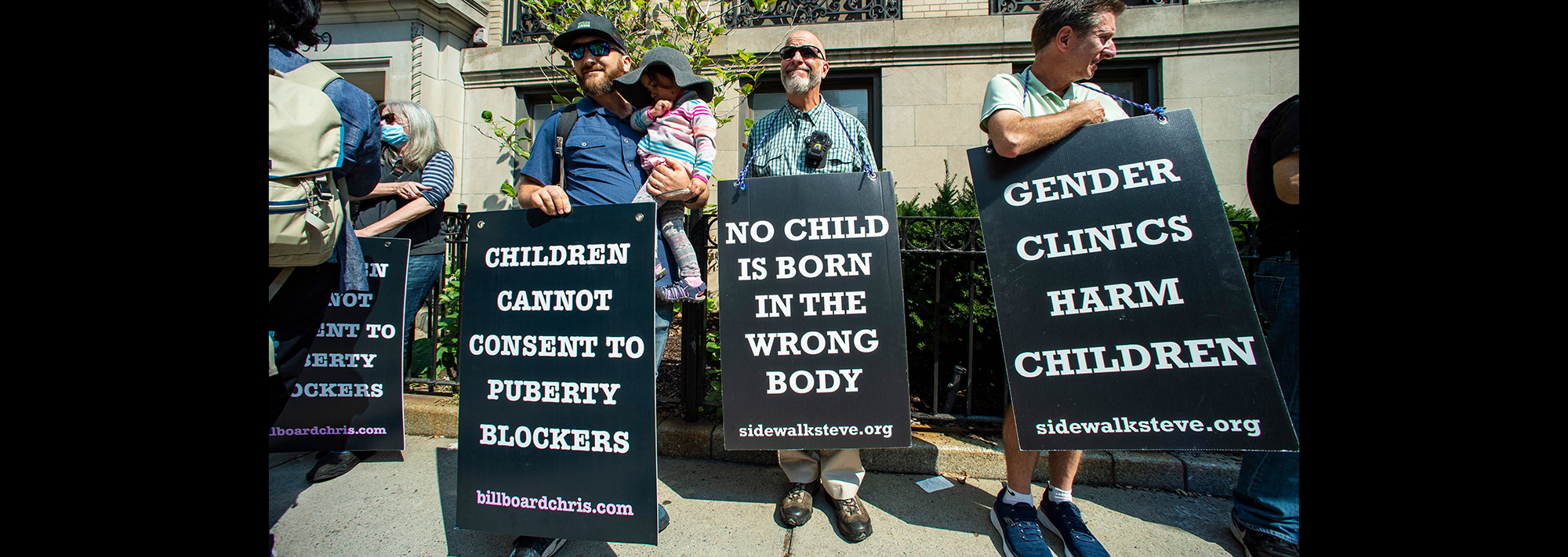
Right-wing political and religious groups are waging a disinformation campaign based on phony science to dehumanize transgender people and deny them full political and religious status, said Royal G. Cravens III, senior research analyst at the Southern Poverty Law Center.
The effort also is designed to sow confusion and fear about gender-affirming care, to vilify transgender people and their supporters and to give scientific cover to discriminatory rhetoric and actions, Cravens said during a recent episode of the “State of Belief” podcast hosted by Interfaith Alliance President Paul Raushenbush.

Royal Cravens
“Pseudoscience has been used to construct an anti-trans movement in the past several years geared toward limiting the ability of trans folks to participate in society, taking away access to things like health care and spaces in school and fueling both policy and in-person violent attacks against LGBTQ people,” said Cravens, author of GAWD: How Faith Shapes LGBT Identity and Politics in the United States.
The Southern Poverty Law Center has identified a network of more than 60 organizations behind the production and distribution of pseudoscientific literature designed to provide moral and scientific cover for legislative efforts to ban gender-affirming care, he said. The Human Rights Campaign identifies 22 states where those rights have been banned.
One common example of anti-LGBTQ pseudoscience is the false concept of “rapid onset gender dysmorphia,” Cravens said. The premise suggests youth seeking to change genders “caught” the desire from others, most likely trans children in schools and affirming spaces.
“So, it’s a social contagion that is spread. It’s just an ideology that gets shared and passed around and that people are susceptible to it, and that certain people are more susceptible than others.”
But that’s not the way transgender identity work, he said.
The concept also portrays trans people as sub-human carriers of a disease which in turn provides the motivation and rationale to pursue laws and policies abolishing transgender health care options, he added.
“If you agree to this false notion that trans identity is adopted and passed around through contagion in affirming places, then the policy options available to you are to shut that transmission down and to stop the talking about LGBTQ identities, to ban books about LGBTQ people, to limit curricula about LGBTQ people and to shut down hospitals and medical providers.”
Raushenbush noted the hypocrisy inherent in a movement combining fake science with fundamentalist Christian attitudes toward homosexuality.
“These are the people who often just say, ‘Oh, we don’t trust science on this.’ They are very anti-science on one side, but they are very eager to use the veneer of pseudoscience to reinforce bigotry and to reinforce discrimination.”
It’s also important to identify the threads of racism and Christian nationalism running through LGBTQ hatred, Cravens said. “We know pseudoscience is a tool of white supremacy. It’s been used for centuries to create ways to artificially distinguish between who is deserving and undeserving of things in society, but it’s also a tool of the contemporary Religious Right. It’s a way to encode beliefs, especially divisive beliefs about people using the cover of religion to encode those into our politics.”
Threats and attacks are increasing against affirming churches and schools and libraries where LGBTQ educational materials are available, Cravens reported. “There is no coincidence that spaces that affirm LGBTQ people, that are part of our civil society and make our democratic, multiracial democracy work, those places are under attack, especially by far-right activists.”
Free speech related to LGBTQ issues is also under assault by white Christian nationalists, he added. “It threatens those who would go back on our pluralistic values and those who would oppose inclusive, multiracial democracy.”
“The reality is that faith is a big part of the lives of most LGBTQ people.”
Another trope promoted by the far right claims a person cannot identify as both LGBTQ and Christian, he said. “It’s a political strategy. Groups will document attacks on LGBTQ-affirming churches, but in public comments they will blame LGBTQ people for attacks on Christians — as if LGBTQ people can’t be Christian.”
The historical reality is quite different from such stereotypes, Craven said. Most LGBTQ people raised in churches maintain some form of religious or spiritual identity, and many continue to find encouragement and strength from their faith.
“The idea though that LGBTQ people aren’t religious has been deeply ingrained in our understanding of who LGBTQ people are. And it’s false because it’s a political construction. The reality is that faith is a big part of the lives of most LGBTQ people.”
One way for churches to oppose Christian nationalism is to become affirming spaces for LGBTQ people, Raushenbush said.
Craven agreed but added the historic struggles of LGBTQ Christians provide a model for wider resistance to Christian nationalism. “What the history of LGBTQ faith and LGBTQ-affirming faith has shown us is that inclusive, non-coercive faith can be a template for pushing back against the forces that would deny pluralism, and to allow for a more inclusive and accepting society where faith communities can empower folks to engage in politics in productive and inclusive ways.”



